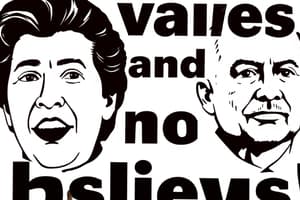Podcast
Questions and Answers
What is the Latin root of the word 'propaganda' and what does it mean?
What is the Latin root of the word 'propaganda' and what does it mean?
"Propagare," meaning "to propagate or sow"
What are the three terms associated with propaganda mentioned in the text?
What are the three terms associated with propaganda mentioned in the text?
"Spin", "news management", and "public relations"
What is the purpose of public relations?
What is the purpose of public relations?
To build a positive relationship with the public
According to Jowett and O'Denviell, what is the goal of propaganda?
According to Jowett and O'Denviell, what is the goal of propaganda?
What are values?
What are values?
What was the Institute for Propaganda Analysis (IPA) formed to investigate?
What was the Institute for Propaganda Analysis (IPA) formed to investigate?
What is the meaning of 'spin', in relation to propaganda?
What is the meaning of 'spin', in relation to propaganda?
What is the term used to describe how the ruling class uses cultural institutions to maintain power, according to Gramsci?
What is the term used to describe how the ruling class uses cultural institutions to maintain power, according to Gramsci?
According to the provided text, what are the two main element types that make up a person's lifestyle?
According to the provided text, what are the two main element types that make up a person's lifestyle?
What is the term originated by Antoine Destutt de Tracy which describes a system of ideas, beliefs, understandings, and attitudes?
What is the term originated by Antoine Destutt de Tracy which describes a system of ideas, beliefs, understandings, and attitudes?
What market model operates based on supply and demand in order to achieve a point of profit maximization?
What market model operates based on supply and demand in order to achieve a point of profit maximization?
Name one of the seven propaganda devices listed in the provided text.
Name one of the seven propaganda devices listed in the provided text.
What propaganda technique uses the idea that 'everyone is doing it'?
What propaganda technique uses the idea that 'everyone is doing it'?
What is the propaganda technique that involves presenting a biased argument by leaving out opposing evidence?
What is the propaganda technique that involves presenting a biased argument by leaving out opposing evidence?
What type of propaganda involves using vague phrases to connect with an audience's values, without specific details?
What type of propaganda involves using vague phrases to connect with an audience's values, without specific details?
What propaganda technique uses the authority of a person or symbol to promote a message?
What propaganda technique uses the authority of a person or symbol to promote a message?
Which propaganda technique shows the spokesperson as someone who comes from humble origins and represents the audience's interests?
Which propaganda technique shows the spokesperson as someone who comes from humble origins and represents the audience's interests?
What is it called when the 'voice of the people' is used to endorse a person, idea, or product?
What is it called when the 'voice of the people' is used to endorse a person, idea, or product?
What propaganda technique involves using negative words to create an unfavorable opinion?
What propaganda technique involves using negative words to create an unfavorable opinion?
According to the Apparatus Theory of Media, why is cinema considered ideological?
According to the Apparatus Theory of Media, why is cinema considered ideological?
Give an example of an ideology in the media.
Give an example of an ideology in the media.
What is the goal of 'name calling' propaganda?
What is the goal of 'name calling' propaganda?
Flashcards
Cultural Hegemony
Cultural Hegemony
A social phenomenon where the ruling class uses cultural institutions to maintain power and wealth.
Althusserian Film Theory
Althusserian Film Theory
The study of how films represent class dynamics and social hierarchies through ideologies.
Ideological Elements
Ideological Elements
Ideas, beliefs, understandings, and attitudes that shape our worldview.
Media Hegemony
Media Hegemony
Signup and view all the flashcards
Lifestyles
Lifestyles
Signup and view all the flashcards
What are values?
What are values?
Signup and view all the flashcards
What is propaganda?
What is propaganda?
Signup and view all the flashcards
What is 'spin' in propaganda?
What is 'spin' in propaganda?
Signup and view all the flashcards
What is the role of public relations?
What is the role of public relations?
Signup and view all the flashcards
What are the 7 propaganda devices?
What are the 7 propaganda devices?
Signup and view all the flashcards
What historical event involved propaganda?
What historical event involved propaganda?
Signup and view all the flashcards
Why did propaganda become associated with negative connotations?
Why did propaganda become associated with negative connotations?
Signup and view all the flashcards
Bandwagon
Bandwagon
Signup and view all the flashcards
Card Stacking
Card Stacking
Signup and view all the flashcards
Glittering Generalities
Glittering Generalities
Signup and view all the flashcards
Transfer
Transfer
Signup and view all the flashcards
Plain Folks
Plain Folks
Signup and view all the flashcards
Testimonial
Testimonial
Signup and view all the flashcards
Name Calling
Name Calling
Signup and view all the flashcards
Apparatus Theory of Media
Apparatus Theory of Media
Signup and view all the flashcards
Ideology
Ideology
Signup and view all the flashcards
Media Propaganda
Media Propaganda
Signup and view all the flashcards
Study Notes
Values and Attitudes
- Values are special kinds of beliefs that are unlikely to change.
- They affect a person's behavior.
- Values define what is desirable or undesirable.
- Values are principles used to judge the worth of an idea or practice.
- Values provide criteria for judging.
- Spiritual values dictate actions and decisions based on religious beliefs.
- Attitudes are expressions of responses to events and people.
- Attitudes, also called predisposition or tendencies, can be favorable or unfavorable towards a situation, event, or person.
Propaganda
- Propaganda is disseminating or promoting particular ideas, often to manipulate or deceive.
- Historically linked to advancing religion.
- The Vatican established a congregation for propagating the faith.
- Propaganda was used in earlier times in efforts to counter Protestant movements.
- Modern propaganda is often associated with deceit, manipulation, and lies.
- The Institute for Propaganda Analysis (IPA) was established to study propaganda in the USA in 1937, and analyze the diverse materials at the time.
- Propaganda aims to persuade people to think and act in specific ways.
- Propaganda can be conveyed through various mediums (e.g., social media, print publications, etc.).
Propaganda Devices
- Bandwagon: Appeals to the idea that everyone is doing something, so you should too.
- Card Stacking: Presents only one side of an argument, and obscures opposing evidence.
- Glittering Generalities: Uses positive words to evoke emotions, but does not provide concrete information.
- Transfer: Uses positive traits associated with one person/thing, onto something else/person.
- Plain Folks: Portrays a person or idea as "just like you," relating on a common experience.
- Testimonial: Uses endorsements from famous people to lend credibility.
- Name-Calling: Attempts to discredit the opposition through negative labels.
Media and Ideology
- Ideology is the set of ideas people believe, shaping their understandings and attitudes.
- Ideology can influence media, and often media propagates certain ideologies.
- The French aristocrat Antoine Destutt de Tracy developed the term "ideology" in the 19th century. This term is derived from the Greek word for ideas, or beliefs.
Media Organizations and Stakeholders
- The market model for media organizations uses supply and demand.
- The quantity demanded should equal the quantity supplied for economic equilibrium.
Lifestyles
- Lifestyles are the ways people live, including interest, behaviors, and opinions.
- Lifestyles have tangible elements like social class, income, and status.
- Lifestyles also have intangible elements like values, attitudes, and tastes.
- Mass advertising is a factor in encouraging people to prioritize certain lifestyles.
Studying That Suits You
Use AI to generate personalized quizzes and flashcards to suit your learning preferences.




